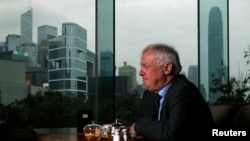Chris Patten was Britain’s final governor of Hong Kong. In that job, he legislated several democratic reforms that were expected to last 50 years. In 1997, the island was returned to China, which had promised to respect its autonomy.
Instead, Patten has watched Hong Kong’s self-rule powers shrink under Chinese control.
What the mainland government has done to Hong Kong is, in his words, the “biggest assault on freedom and liberty in any city in the 21st century.”
Patten made the comment during an online policy discussion last week.
“What they’re doing in Hong Kong is to destroy what was promised in Hong Kong: a high degree of autonomy — one country, two systems. They’re doing that in a way which I must say will give Taiwan even greater room for thought because I’m sure what they’re doing in Hong Kong, they would like to do one day in Taiwan,” he said.
The Canada-based Macdonald-Laurier Institute and the London-based Hong Kong Watch organized the discussion about Hong Kong’s future. The EU-based European Values Center for Security Policy and the multinational Inter-Parliamentary Alliance also took part.
“Hong Kong should simply be another Shenzhen,” Patten says in an attempt to capture the Chinese leader Xi Jinping’s position about the island. Shenzhen is a central coast mainland city close to Hong Kong. The government named it an economic area and administers it differently than other places.
Patten says Xi wants Hong Kong as “a neighbor to Shenzhen that loves China and therefore loves the Communist Party.”
The Chinese Communist Party has decided to rule Hong Kong in the same way as the rest of China. It is restricting or removing the freedoms of Hong Kongers, Patten said. That will slow China’s own economic development, Patten added.
"We know that 70 percent of direct investment that goes into China, and investment that comes out, goes through Hong Kong," he said.
"One reason why so many investors will make their excuses and disappear to Singapore or to Seoul or to Tokyo is because they know the importance of free flow of information," he said. "They know that’s not possible in a Chinese communist system."
In the 90-minute discussion that included other speakers, Patten said the current 10 years “may represent what’s called ‘peak China.’”
“It’s true that China is the largest country in the world, and it’s true that China is a huge market for us. But the truth of the matter is: China needs us just as much, and perhaps…even more, than we need China.”
British exports to China have increased in real terms by just 3 percent since 1980, while China’s exports to Britain have risen by 9 percent, he said. “So, who’s helping whom?”
Patten said questioning Chinese actions in Hong Kong is not being anti-China.
“It is not anti-Chinese to say we should stand up for liberal democracy," he said. “Standing up for liberal democracy means standing up for one another,” not the least those in Hong Kong and in the rest of China.
Since 2003, Patten has served as chancellor of Oxford University. He urged the international community to help “provide a lifeline” to those brave enough to resist the Chinese government and Hong Kong officials that support it. This should include providing more Hong Kong students with the chance to study at universities around the world, he said.
I'm Susan Shand.
VOA’s Natalie Liu reported this story. Susan Shand adapted it for Learning English. Caty Weaver was the editor.
________________________________________________________________
Words in This Story
autonomy – n. self-rule, or self-direction
assault – v. to attack
peak – adj. the highest point
chancellor – n. a high official










